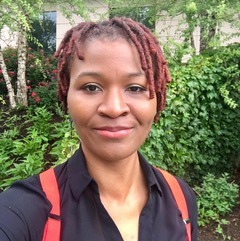Let me introduce you to the woman I was three years ago. This woman didn’t know the first thing about the theory of positive disintegration, but she knew the intensity of her inner world ruled her life—and made her miserable. She felt driven to pursue productivity and achievement to exhaustion and once inconsolably sobbed over a mistake on an Excel spreadsheet. When happy, she was ecstatic, but when sad, she plunged to the nadir of despair where she often contemplated suicide. She lived a lonely, transient existence, drifting mindlessly through jobs, cities, relationships, and interests with no true direction or inspiration. She often smiled on the outside but cried inside. Would her life always be this way?
Thankfully, this woman no longer exists. In her place stands a contented stranger. I’m getting acquainted with this stranger now.
A Drive to Achieve
As a child, I brimmed with boundless mental and physical energy. My grade school track and field ribbons overwhelmed the refrigerator; my volleyball uniform was sprawled on the bed next to my flute and saxophone. I started a scrapbook for my growing collection of awards and certificates. I learned that achievements got attention; I quietly hoped they would also get acceptance. I believed I just hadn’t achieved that ultimate thing yet that would earn me that most coveted prize of belonging, and with it, relief from the relentless internal pressure to achieve.
So I kept trying. As an adult, I entertained no less than a dozen hobbies and interests at a time. At university, I studied technical theater until a representative from the music department heard me perform at a talent show and promptly recruited me. I subsequently studied education, business, and English; I then transferred to another university, yet miraculously graduated within four years with a completed bachelor’s degree through sheer will power and determination.
My intense drive was fueled by the mantra, “If you work hard, you can achieve anything.” And it seemed to work: it landed me a coveted position at the US State Department in Washington, DC. Along with it came many of society’s markers of success, including a sports car (red, of course), a trendy city apartment, and designer clothing. It was an existence known to my friends and family as “the perfect life.”
But this perfect life left me bored and unhappy. In an effort to fill the void one year, I decided to learn French by committing to hours of intense, self-directed practice culminating in 18 hours of train and bus travel from Washington, DC to Quebec City to attend a summer French Immersion course. I made lifelong friends, explored the historically rich Quebec City, and had a fabulous time.
It was an existence known to my friends and family as “the perfect life.” But this perfect life left me bored and unhappy.

When I was waiting at the bus terminal to return to DC, I began to sob. Facing a return to the mundane, inauthentic life that I had created in Washington, I was filled with dread.
On that long trip home, I had time to think. It seems I reached a point in life where my typical coping mechanisms were no longer sufficient to handle my increasing internal disharmony. I’d been busy achieving for so long that I never stopped to consider whether there was any other way to live. I assumed that crippling anxiety and insecurity were just a permanent part of the package that was my life—as were the perfectionism, extreme existential depression, suicidal ideation, and the nagging shame I felt over the fact that I had no idea who I really was.
Living in Primary Integration
Before things fell apart, my primary goals were to achieve what my family, society and culture expected of me.
I am an African American woman who grew up in an Evangelical Christian home. I was expected to remain a virgin until marriage; I wore a simple silver purity band inscribed with “True Love Waits” on the inside just in case I forgot my promise to remain pure until God sent me a husband. I scoffed at those “loose women” who wore immodest clothes like tight jeans or showed their cleavage or kissed or held hands with men. And anything but heterosexuality? That wasn’t even on my radar.
After God sent me my husband, it would be my duty to remain active in my church, share my spiritual gifts with the world, be an excellent wife and mother, and of course, still balance it all with outstanding career success and achievements.
God, however, wasn’t moving quickly enough, so I obsessively searched for my husband at church functions and through online dating sites. To be honest, I wasn’t quite sure what a “good husband” would look like. It never occurred to me to evaluate what I wanted in a partner. Instead, I delegated that important task to God, knowing that he would have the best judgment.

And yet, through sheer willpower, I was determined to “achieve” this expected societal milestone—and I almost did. I have three failed engagements and one cancelled wedding ceremony to show for my efforts. The problem was, whenever my friends asked me “What kind of men do you like?” my mind went blank. You know, I never really felt too interested in men. Was I supposed to feel attracted to them? It never occurred to me that I had to be attracted to the men I was willing to marry. I just thought marriage was a Christian goalpost that needed to be achieved and that I could achieve it the same way I’ve done everything else in my life—through sheer determination.
So as I crisscrossed the country to attend my friends’ weddings, I felt anxious watching them achieve the goal that I couldn’t quite reach. My friends with kids asked if I wanted to babysit—just until I could experience the joy of having children of my own—but I always declined. I never really enjoyed children; in fact, I went to great lengths to avoid them whenever possible.
Who was this God who was supposed to be guiding my path, anyway? I wasn’t sure I really knew him. Was God even real? I was no longer sure….
Unilevel Disintegration and My Personas
As these conflicts grew increasingly uncomfortable, my internal world sank further into confusion. I survived this period by relying on a what I call personas—that is, a series of carefully crafted false personalities that helped me to compartmentalize the conflicting pieces of myself and interact more easily with the world (at least for a while). These personas seem to represent what Dabrowski was talking about when he said that unilevel disintegration (level II in his theory of positive disintegration) involves recognizing different paths, but not being able to determine which is the higher or the lower.
Here is a small sampling of the many personas I used to cope with my maladjustment:
Smiling Christian Woman: This woman is dedicated to evangelism and a role model in the church. She remains offended by loose, immodest women and fiercely defends her sexual innocence. She maintains with a coy smile that she doesn’t have a clue about sex or other improper pursuits, and is still hoping God will send her perfect Christian husband so she may fulfill her duties to her family by becoming a wife and mother. Smiling Christian Woman was found at church functions and other places full of pious people.
City Career Woman: This woman works ten-hour days and is always on the prowl for new ways to climb the professional ladder. She goes to a lot of trouble to makes the right connections, and she will do anything for a leg up on the competition –even sabotage or lying. She often impressed people with her confident smile and her ability to unflinchingly assert her strong views; for example, “Children are absolutely dreadful, expensive, and ruin careers.” City Career Woman made her appearance at work, as well as at happy hours at trendy city lounges, where she could be seen mingling with groups of upwardly mobile men.

Sensual Bisexual Woman: This woman clandestinely liaises with beautiful women, whom she prefers over men, even though she doesn’t really feel like a lesbian; she just wants to have some fun until the right man comes along. Anyway, being gay is only a bad thing is you’re religious, and Sensual Bisexual Woman identifies as agnostic. She starts with a few quick conversations before a first discreet date—then come trips to trendy restaurants, plays, and coffee shops, usually until the would-be partner refuses to be kept secret any longer. Then Sensual Bisexual Woman would simply disappear without a trace and stop returning phone calls, leaving behind a trail of angry, confused, and disappointed lovers. Sensual Bisexual Woman could be found at LGBTQ events, holding a rum and Coke and boldly approaching the shy women who hide along the walls.
But the energy required to maintain these disparate personas was unsustainable. It’s impossible to create authentic and deep friendships when you’re acting—which meant that having all of my friends in one room was out of the question. People told me that they felt I was “holding something back,” and yes, I was—entire parts of my authentic self. These conflicting personas could not co-exist. The tension between them created anxiety and shame in my life. I considered suicide frequently.
It’s impossible to create authentic and deep friendships when you’re acting—which meant that having all of my friends in one room was out of the question
A public breakup and the calling off of a wedding two months after invitations were sent caused me hit peak maladjustment. My soul was screaming that I didn’t want to get married and I didn’t want to have children. I was dreading it so much that I was relieved when the wedding was called off for unrelated reasons.
I had been so close to achieving my false ideal. What would have happened if I succeeded? The real me would have been buried and lost forever, and no one would ever know the real me. That was a terrifying thought.
But it was also terrifying to imagine life without my personas. Without them, I knew I would lose friends—and I feared that I might lose everything. But I couldn’t live without at least trying to discover my authentic self. Alone in my lonely apartment, I asked myself an important question: “Who am I?”
Sorting Out My Intensity
Which persona is closest to my authentic self? They’re all radically different, and yet, each was equally true in many ways, so I didn’t know where to start.
This was where exploring another side of myself helped: that part of me that Third Factor readers would call “overexcitable.”
I vaguely remember being tested for giftedness as a child. At one point, there was a brief discussion about grade acceleration, but I was part of a transient military family, so there was no need to bother; we would be moving to a new assignment soon. Besides, my family figured that if I was so smart, I would be fine in any school. The issue never resurfaced—until now.
So I joined a community that discussed adult giftedness, and it was in this group that I was introduced to the concept of overexcitabilities (OE) and the five domains in which it’s expressed: intellectual, imaginational, emotional, sensual, and psychomotor. I went down the list.
Psychomotor OE: “That’s me!” I screamed while typing a response on my laptop and bouncing around the room at 3 a.m. At 19 years old, I had received a ADHD diagnosis that never quite felt like it fit. I had posted before in online forums for gifted adults about how I was an insomniac who couldn’t sleep. “I stay up all night,” I proclaimed proudly. “That’s because I’m so intense! It’s clearly the over excitability at work!” I added for effect.
Intellectual OE: That’s me, too! My appetite for knowledge is insatiable. Maybe this is why I’m a workaholic. Sometimes I will work without sleeping. I’m so INTENSE.
Emotional OE: Oh yes, this is why I’m always depressed and anxious, I thought.
So this explains it. My life will always be this way, I concluded—chaotic, transient, and anxious. When I first learned about overexcitability, I thought it meant I was doomed to remain this sad, smiling-on-the-outside, crying-on-the-inside woman who doesn’t fit in anywhere.

Toward Reintegration
Thankfully, I was wrong.
Since I asked myself that all-important question—“Who Am I?”—three years ago, I’ve been on a herculean journey of deliberate personality formation. I hired life coaches. I attended silent yoga retreats in the mountain. I read numerous books about authenticity and the development of values. I reviewed my life choices up to this point. I reflected on the journals that I’ve been writing since fifth grade and established truer, more authentic values for myself.
I can answer the question now, though I feel as though I am getting acquainted with a stranger. Abolishing my personas and uncovering authenticity was no easy feat. It was a highly personal experience, but I will share a few moments from the journey.
One of my first steps was to commit to a yoga and mindfulness practice. The concept of mindfulness changed my life tremendously because for the first time, I wasn’t busy—and I loved that! I felt a sense of calm that I never could glean from achievements and busyness. Through meditation, I started to get in touch with my inner thoughts, feelings and desires. It was during a meditation session that I decided to withdraw from graduate school to have more time to enjoy life. This realization came to me with such clarity that the next morning I called the school to withdraw even though I had a 4.0 average.
In these meditative sessions, I did something I had never done before: I asked myself what my values are. Before, I was judging my achievements based on societal, cultural, and familial values. So I wrote a list of my personal values:
Simplicity. Community. Freedom. Authenticity.
Through meditation, I started to get in touch with my inner thoughts, feelings and desires. I did something I had never done before: I asked myself what my values are.
Suddenly it was clear. The life I was living was built around financial, career, educational, and material success, but all of these were out of alignment with my personal values. This explained why despite my “success,” I was still unhappy. I vowed from that point forward to make decisions based on my values and to discard the old, external values that didn’t serve me.
I also sought community. I established a local Meetup group for gifted adults and dedicated myself to maintaining the meetings even if no one showed up. I did this mainly because I had to do something; it was simply unacceptable for me to continue existing without finding a place where I could finally speak—and be heard and understood. In these meet-ups, I found peers who could handle the vastness of who I was even when I didn’t filter it through a persona.

During these meetings, I found that I could finally discuss some of my favorite topics—quantum physics, science fiction, permaculture, linguistics, psychology and other topics that were typically off limits to the people I interacted with through my clunky, limited personas. I was around like-minded peers, so it felt safe for me to present as my authentic self rather than cloaking myself with layers of false personas. Thanks to the valuable gift of like-minded peers that I found through this group, my feelings of “otherworldliness” started to diminish.
Through this experience, I learned to look at my intellectual overexcitability as a raging fire that must be fueled efficiently. You can throw dry leaves and twigs on a fire to keep it burning for a while, but if you really want a robust, lasting blaze, you should throw a big log in the fire. Then you can sit back and relax for a bit. The way I put a log on my intellectual fire was to narrow my dozens of hobbies to a few carefully selected passions that I could explore deeply for many years without being bored, and that are in alignment with my personal values. In my case, I picked permaculture and sailing. I’m confident that I’ll be learning new things about these interests for years.
I learned to look at my intellectual overexcitability as a raging fire that must be fueled efficiently. You can throw dry leaves and twigs on a fire to keep it burning for a while, but if you really want a robust, lasting blaze, you should throw a big log in the fire. Then you can sit back and relax for a bit.
Farewell, Personas
As for the Personas, they all needed to be reconciled—and in some cases, dismantled. Smiling Christian Woman had to be completely rethought after my loss of faith. I allowed myself to completely rebuild my spiritual ideas from scratch without the influence of my family or any preexisting beliefs. I visited various Christian churches, Buddhist temples, and meditation centers, until I landed at the Unitarian Universalist Church as an atheist. This felt right, so I was able to put away Smiling Christian Woman for good.
I’m happy God never sent me that husband I was praying for, because it turns out I’m not bisexual, but definitely a lesbian. This long suppressed realization helped me reconcile what was real in the Sensual Bisexual Woman persona with my authentic self before abolishing the remainder of her as well.
City Career Woman was dismantled differently. During my period of self-evaluation, I went to a sailing school about an hour away from the city. Many thought it was just another of my capricious interests, but I’ve dreamed of sailing over the waves for years. Through sailing, I felt true happiness for the first time in years. The experience made the excitement I had felt from promotions or bonuses feel lackluster in comparison.
So—when I quit my stressful city job and bought an 83-year-old cottage in the bayside town where I learned to sail, my city friends and family thought I had lost my mind.
Those who knew the City Career Woman persona tried to talk me through my apparent loss of sanity by reflecting back who they believed me to be. “This isn’t you!” they insisted. “You’re a hard driving confident career woman destined for upward mobility. Those are your dreams!”
Meanwhile, those who knew Good Christian Woman yelled, “Hey! You can’t be a lesbian—you’re a good Christian woman who wants to marry a good Christian man!”
I explained to them all that, actually, those were the goals of my personas—not of my authentic self.

And as I anticipated, during my process of dropping the personas and learning to live authentically, I did lose many friends, but by simply being myself, I’ve gained more than I lost. I emerged as a more unified, happier and truer version of those fragmented, anxious personas. The parts that were authentic I incorporated; the parts that were false I discarded. I learned that I am not defined by my achievements. I’ve become more comfortable with a lack of busyness.
As I anticipated, during my process of dropping the personas and learning to live authentically, I did lose many friends, but by simply being myself, I’ve gained more than I lost.
Most notably, those parts of my personality that seemed to exist just to make my life miserable—like the intensity that fueled my drive to “succeed”—affect me less now. My anxiety and depression have greatly diminished. I sleep regularly and without issue, and I no longer bounce around the room or run through my house. The cessation of these lifelong behaviors is striking, but that manifestation of intensity belongs to that woman who no longer exists. The fragments of her have been integrated with my current self.
Have I diminished somehow because my internal landscape is quieter and more integrated? I don’t believe so. I’m still the same sharp, intense, quick learner I was from the beginning, but with greater self-knowledge and refined discernment.
Ultimately, my overexcitability served me with never-ending whispers that I was living a lie. It’s a relief to know that I don’t have to live forever in that acute phase of disintegration where OE is most evident, but without my overexcitability, I would not have experienced the unbearable unhappiness that pushed me to evolve into a happier, more authentic version of myself.




